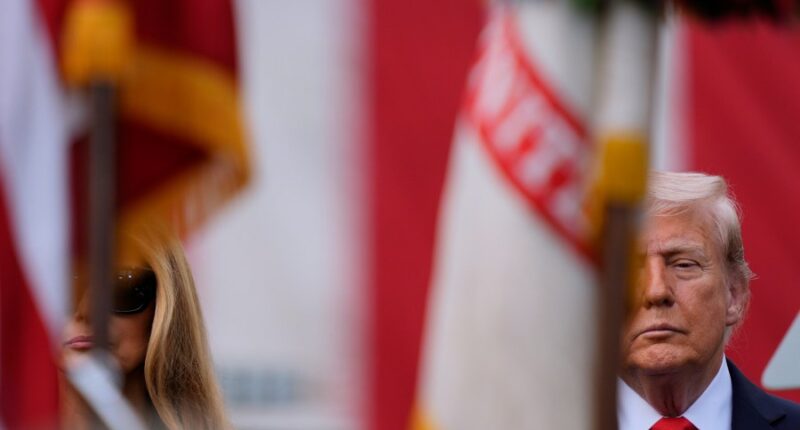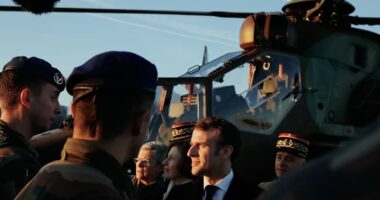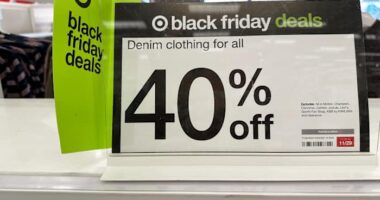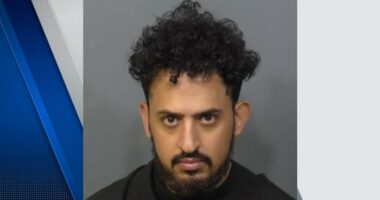Share this @internewscast.com

BASKING RIDGE, N.J. (AP) — President Donald Trump suggested on Saturday that halting all oil purchases from Russia by NATO countries, alongside imposing tariffs of 50% to 100% on China for its acquisition of Russian oil, could bring an end to the Russia-Ukraine conflict.
In a post on his social media platform, Trump criticized NATO’s commitment to resolving the war, claiming it was “far less than 100%.” He found it “shocking” that some alliance members continue to purchase Russian oil, asserting that such actions “significantly weaken their bargaining power over Russia.”
As of 2023, Turkey ranks as the third-largest buyer of Russian oil within NATO, following China and India, based on data from the Centre for Research on Energy and Clean Air. Other NATO members purchasing Russian oil include Hungary and Slovakia. It remains uncertain if Trump intends to confront Turkish President Recep Tayyip Erdogan or Hungarian Prime Minister Viktor Orbán directly, raising questions about whether such threats would translate into new tariffs or an outright ban on Russian oil.
Trump’s remarks came in the wake of Russian drones entering Polish airspace, a provocative move as Poland is a NATO member. Although these drones were shot down by Poland, Trump downplayed the incident, describing it as potentially a “mistake.”
Despite promising during his candidacy to swiftly end the war, Trump has yet to effectively leverage the necessary pressure points for peace and has sometimes appeared hesitant to confront Russian President Vladimir Putin. Presently, Congress is advocating for the U.S. president to endorse a bill aimed at intensifying sanctions, following unsuccessful peace talks with Putin Trump hosted in Alaska last month.
The U.S. and its partners aim to demonstrate stronger resolve against Russia. At an emergency U.N. Security Council meeting on Friday, acting U.S. Ambassador Dorothy Shea assured that America “will defend every inch of NATO territory,” critiquing the incident with drones in Poland as a significant disrespect, intentional or not, towards U.S. diplomacy aimed at resolving the conflict.
Britain on Friday also took steps to penalize the trading of Russian oil, including a ban on 70 vessels allegedly used in its transportation. The United Kingdom also sanctioned 30 individuals and companies, included businesses based in China and Turkey, that have supplied Russia with electronics, chemicals, explosives and other weapons components.
Trump in his post Saturday said a NATO ban on Russian oil plus tariffs on China would “also be of great help in ENDING this deadly, but RIDICULOUS, WAR.”
The president said that NATO members should put the 50% to 100% tariffs on China and withdraw them if the war that launched with Russia’s 2022 invasion of Ukraine ends.
“China has a strong control, and even grip, over Russia,” he posted, and powerful tariffs “will break that grip.”
The U.S. president has already imposed a 25% import tax on goods from India, specifically for its buying of Russian energy products. He has placed in total a 50% tariff on India, though Trump has indicated that negotiations with Indian Prime Minister Narendra Modi could help settle differences.
The prospect of further import tax hikes on China and its retaliation could carry collateral damage for the U.S. and European economies.
Earlier this year, Trump hit Chinese goods with new tariffs totaling 145%, prompting China to respond with 125% import taxes on American goods. Taxes at that level were essentially a blockade on commerce between the world’s two largest economies, causing worries about global growth that led to negotiations that ratcheted down the tariffs being levied by both nations.
So that trade talks could proceed, America lowered its tariffs against China to a still-high 30%, while China took its rate to 10%.
In his post, the Republican president said responsibility for the war fell on his predecessor, Democrat Joe Biden, and Ukrainian President Volodymyr Zelenskyy. He did not include in that list Putin, who launched the invasion.
Trump’s post builds on a call Friday with finance ministers in the Group of Seven, a forum of industrialized democracies. During the call, U.S. Trade Representative Jamieson Greer and Treasury Secretary Scott Bessent called on their counterparts to have a “unified front” to cut off “the revenues funding Putin’s war machine,” according to Greer’s office.













